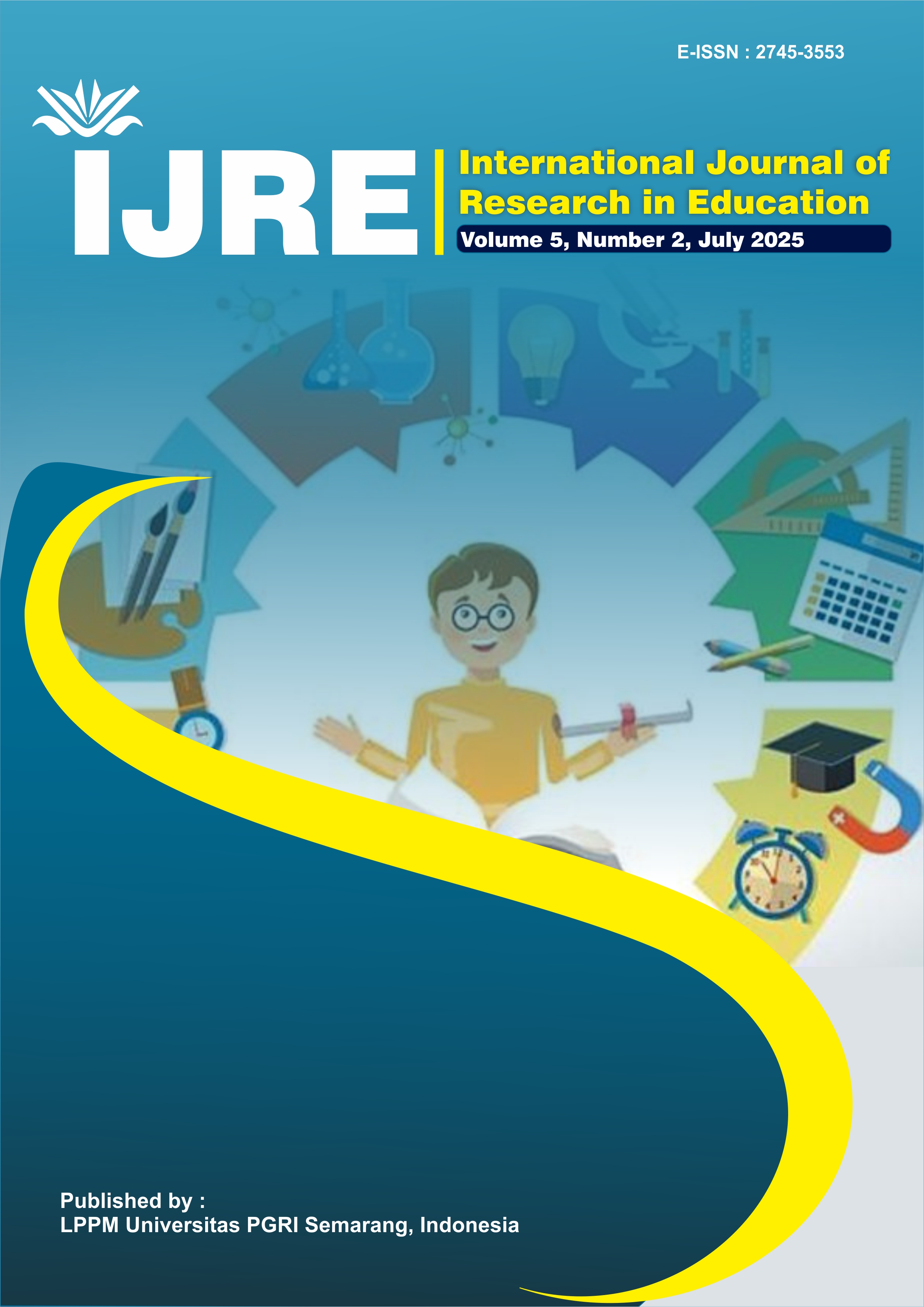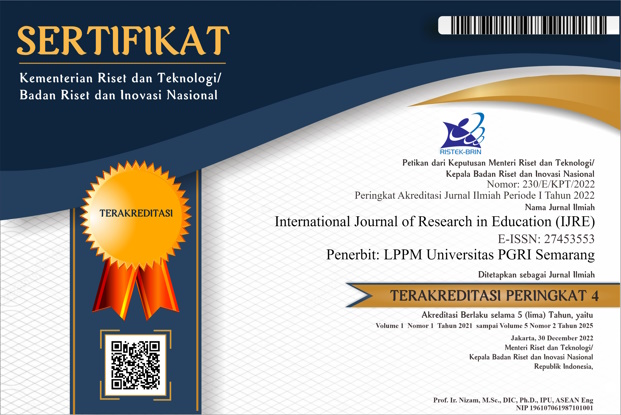Contextual Analysis of Bilingual Program at SD Muhammadiyah Jakarta: An Evaluative Case Study Based on the CIPP Model and Ecological Systems Theory
DOI:
https://doi.org/10.26877/hwd8nx06Keywords:
bilingual program, CIPP evaluation, ecological system, Islamic education, translanguagingAbstract
This study aims to evaluate the implementation of the bilingual programme at SD Muhammadiyah Jakarta using the CIPP (Context, Input, Process, Product) evaluation model combined with Bronfenbrenner's ecological systems theory. This topic is important as it reflects the integrative efforts of Islamic-based education with the global need for multilingual competencies, particularly in the context of urban Islamic schools facing social, cultural, and policy complexities. This study employs a qualitative approach with an intrinsic case study design. Data were collected through classroom observations, in-depth interviews with students, teachers, school principals, and parents, as well as school documentation. Analysis was conducted thematically based on the CIPP dimensions and ecological systems. The findings indicate that the bilingual programme is implemented systematically with strong cross-system support, including active participation from teachers, principals, and parents. Translanguaging strategies have proven effective in helping students understand the material without neglecting Islamic values. These findings expand the application of the CIPP model and ecological theory in the context of values-based bilingual education. This research contributes to the development of a holistic evaluative approach and provides a policy basis for Islamic schools to implement contextual and sustainable bilingual programmes. Further research is recommended to adopt a longitudinal and mixed-methods design to strengthen the validity and scope of the findings.
References
Al-Shanawani, H. M. (2019). Evaluation of Self-Learning Curriculum for Kindergarten Using Stufflebeam’s CIPP Model. Sage Open, 9(1). https://doi.org/10.1177/2158244018822380
Alvear, S. (2018). The Additive Advantage and Bilingual Programs in a Large Urban School District. American Educational Research Journal, 56(2), 477–513. https://doi.org/10.3102/0002831218800986
Ball, M., Bhattacharya, J., Zhao, H., AKPE, H., Brogno, S., & Jasińska, K. K. (2023). Effective Bilingual Education in Francophone West Africa: Constraints and Possibilities. https://doi.org/10.31730/osf.io/tjuwz
Centeno, M. C. G., Escobar, L. d. P., López, N. R., & Patier, C. C. (2020). The Impact of the Introduction of Bilingual Learning on Sixth Grade Educational Achievement Levels. Plos One, 15(6), e0234699. https://doi.org/10.1371/journal.pone.0234699
Creed, E., Filippi, R., & Holliman, A. (2024). Teaching Bilingually: Unlocking the Academic and Cognitive Potential—Teachers’ Insights. Education Sciences, 14(4), 406. https://doi.org/10.3390/educsci14040406
Huang, J., Zeng, L., Li, Y., & Wu, D. (2023). Assessing Key Determinants of Bilingual Education: An Examination of Language Policy, Bilingual Teacher Identity, and Student Language Proficiency. The Educational Review Usa, 7(9), 1321–1325. https://doi.org/10.26855/er.2023.09.015
Lansey, K. R., Burnette, K., & Ryndak, D. L. (2023). Disrupting the System: How Social Systems Perpetuate Educational Segregation of Students With Extensive Support Needs. International Journal of Special Education (Ijse), 38(1), 58–68. https://doi.org/10.52291/ijse.2023.38.6
Lee, H. J., Kang, S. H., Park, S., Chun, W. J., & Youk, K. I. (2024). Evaluation of a Basic-Clinical Integrated Pharmacology Case-Based Learning Program From a Student Perspective Using the CIPP Model. Korean Journal of Medical Education, 36(4), 429–434. https://doi.org/10.3946/kjme.2024.308
Morais, M. C. d., Hübner, L. C., & Welp, A. K. de S. (2023). Translanguaging in Brazilian Bilingual Education: Analyzing Attitudes and Perceptions of Translanguaging Practices in Fifth-Grade Students and Their Teachers. Revista Do Gelne, 25(1), e29882. https://doi.org/10.21680/1517-7874.2023v25n1id29882
Morita‐Mullaney, T., Renn, J., & Chiu, M. M. (2020). Obscuring Equity in Dual Language Bilingual Education: A Longitudinal Study of Emergent Bilingual Achievement, Course Placements, and Grades. Tesol Quarterly, 54(3), 685–718. https://doi.org/10.1002/tesq.592
Palacios-Hidalgo, F. J., Parra, M. E. G., Espejo-Mohedano, R., & Abril, C. H. (2021). Employment, Work Abroad and Bilingual Education: Spanish Bilinguals Graduates’ Self-Perceived Employability, Mobility and Intercultural Competence. Journal of Teaching and Learning for Graduate Employability, 12(2), 279–298. https://doi.org/10.21153/jtlge2021vol12no2art1077
Palmer, D. K. (2018). Supporting Bilingual Teachers to Be Leaders for Social Change:“I Must Create Advocates for Biliteracy.”. International Multilingual Research Journal, 12(3), 203–216. https://doi.org/10.1080/19313152.2018.1474063
Parra, G. (2021). The Effects of Multisensory Approach in the Development of the Reading Comprehension Skill. https://doi.org/10.51508/intcess.202145
Parra, M. E. G., Abril, C. H., & Espejo-Mohedano, R. (2021). Key Factors to Evaluate the Impact of Bilingual Programs: Employability, Mobility and Intercultural Awareness. Porta Linguarum Revista Interuniversitaria De Didáctica De Las Lenguas Extranjeras, 35, 93–104. https://doi.org/10.30827/portalin.v0i35.15453
Renn, K. A., & Smith, B. R. G. (2023). Ecological Models in Higher Education Research: Overview and Synthesis. New Directions for Higher Education, 2023(204), 11–22. https://doi.org/10.1002/he.20491
Sari, S. N., Rahmawati, D. L., Alfajri, R., Friyatmi, F., & Susanti, D. (2024). Evaluation of the Pre-Service Teacher Professional Education Using CIPP Model. Jurnal Inovasi Pendidikan Ekonomi (Jipe), 14(1), 83. https://doi.org/10.24036/011286400
Shih, Y.-C. D., & Yuan, Y.-P. (2019). Evaluating an English Elite Program in Taiwan Using the CIPP Model. The Journal of Asiatefl, 16(1), 200–219. https://doi.org/10.18823/asiatefl.2019.16.1.13.200
Surdyanto, A. (2018). A Brief View on Bilingual Schools in the Capital of Indonesia. Ijee (Indonesian Journal of English Education), 5(1), 1–15. https://doi.org/10.15408/ijee.v5i1.8018
Suri, S., & Hariyati, N. (2024). CIPP Evaluation Model in the Educational Evaluation: A Literature Study. Cahaya Pendidikan, 10(1), 20–30. https://doi.org/10.33373/chypend.v10i1.5950
Tochon, F. V. (2009). The key to global understanding: World languages education-why schools need to adapt. Review of Educational Research, 79(2), 650–681. https://doi.org/10.3102/0034654308325898
Umam, K. A., & Saripah, I. (2018). Using the Context, Input, Process and Product (CIPP) Model in the Evaluation of Training Programs. Ijpte International Journal of Pedagogy and Teacher Education, 2, 19. https://doi.org/10.20961/ijpte.v2i0.26086
Vital, L. M., & Yao, C. W. (2023). An Equity‐driven Ecological Model for Internationalizing Doctoral Student Research Training. New Directions for Higher Education, 2023(204), 47–57. https://doi.org/10.1002/he.20493
Vogel, S., Hoadley, C., Castillo, A. R. M., & Ascenzi‐Moreno, L. (2020). Languages, Literacies and Literate Programming: Can We Use the Latest Theories on How Bilingual People Learn to Help Us Teach Computational Literacies? Computer Science Education, 30(4), 420–443. https://doi.org/10.1080/08993408.2020.1751525
Wang, X., McGuckin, C., & Zhang, C. (2023). Reviewing China’s Unequal Education System Based on Ecological System Theory. Jurnal Ilmu Pendidikan, 29(2), 65. https://doi.org/10.17977/um048v29i2p65-75
Wijayanti, A., Lestari, R., & Yulia, Y. (2018). An Evaluation Study of Bilingual Program in Fawwaz Global Islamic School Yogyakarta. Jellt (Journal of English Language and Language Teaching), 2(1), 1. https://doi.org/10.36597/jellt.v2i1.2704
Zein, S. (2018). English, Multilingualism and Globalisation in Indonesia. English Today, 35(1), 48–53. https://doi.org/10.1017/s026607841800010x



